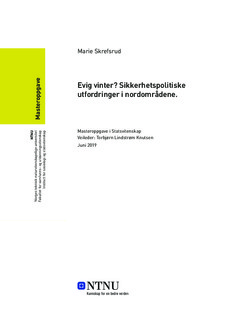| dc.contributor.advisor | Lindstrøm, Knutsen Torbjørn | |
| dc.contributor.author | Skrefsrud, Marie | |
| dc.date.accessioned | 2019-09-06T14:11:51Z | |
| dc.date.available | 2019-09-06T14:11:51Z | |
| dc.date.issued | 2019 | |
| dc.identifier.uri | http://hdl.handle.net/11250/2613613 | |
| dc.description.abstract | | |
| dc.description.abstract | The ongoing climate change brings back the resource-rich Arctic as a world hotspot for security issues. The rapidly receding Arctic sea ice opens up a new shipping route between Europe and Asia and triggers turbulence in today´s security order. A “Polar Silkroad” through the Northeast Passage will give particularly Asian stakeholders like China and Russia a new interest and position in the Arctic and influence on a new global trade route. Russia is modernizing and strengthening its military presence and capacities in the Arctic substantially, including in the High-Arctic. America is focusing on Arctic security for the first time since the cold war. Yet, the Norwegian security documents do not consider the changing dynamics associated with climate change in the Arctic as a potential security threat, in spite of the direct changes in Arctic military capacities and political changes taking place for both China and Russia. This master thesis investigates Norway´s position and security challenges in the Arctic as a result of climate change. | |
| dc.language | nob | |
| dc.publisher | NTNU | |
| dc.title | Evig vinter? Sikkerhetspolitiske utfordringer i nordområdene. | |
| dc.type | Master thesis | |
